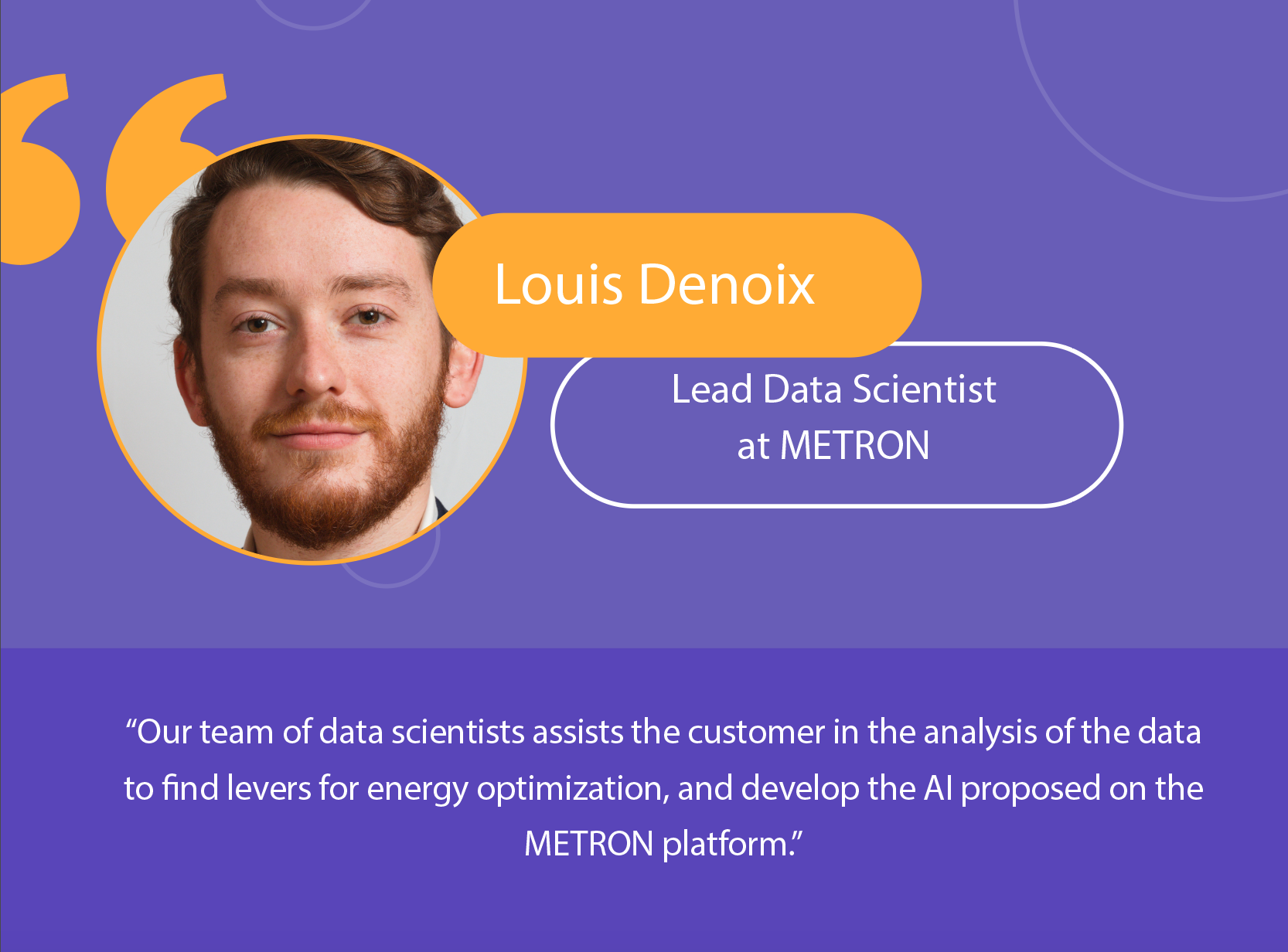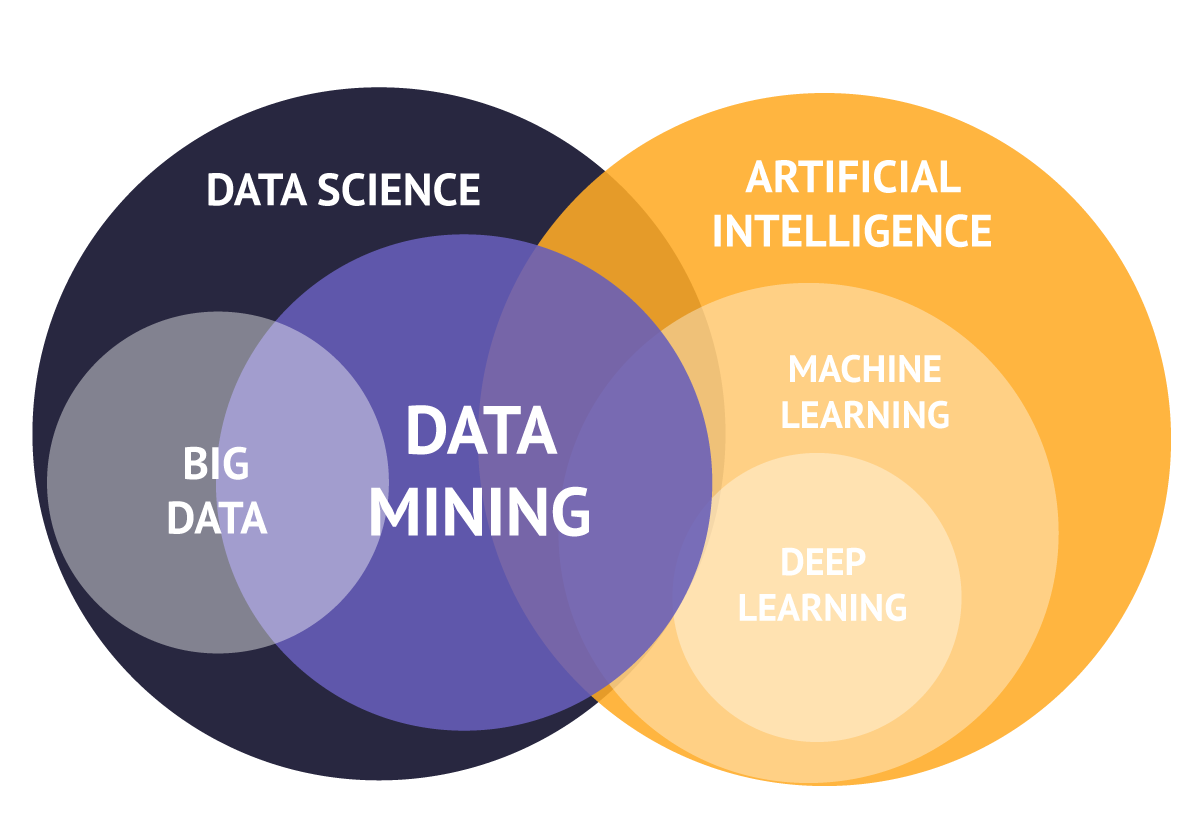Today, Data Science plays a key role in transforming industrial energy data into operational resources to optimize process efficiency in terms of external and internal factors. An Artificial Intelligence (AI) graduate specializing in Data Science, Louis Denoix has been the Lead Data Scientist at METRON for three years, where he heads a team of 7 people across 3 continents (Asia, Latin America, and Europe). He’s here now to talk about the various industrial applications for Data Science, and how to harness it to improve the energy efficiency of production facilities.
How do you define Data Science?
Data Science is a field which incorporates Artificial Intelligence, Data Mining, Big Data, Machine Learning, and Deep Learning.
Today, every company is a goldmine of information which can be used to make strategic recommendations. This is where Data Science comes in: it transforms raw data into knowledge.
By analyzing data, we can detect specific events or phenomena, and then model them to predict how and when they will appear. Thanks to Machine Learning, we can then teach machines to adopt a specific behaviour to respond to them.
Machine Learning and Data Science have already found a number of applications in a huge variety of sectors, ranging from fraud detection to X-ray analysis. These resources are now an essential tool for Industry 4.0, in particular allowing companies to optimize their industrial performance.
Why apply Data Science to industrial energy data?
Every industrial site is a large-scale data generator. Hundreds, if not thousands, of sensors are constantly tracking a factory’s various activities (production, temperature, quality, etc.). This data is often under-used, in particular when it comes to tracking energy use.
With the arrival of Big Data, a new world of technical possibilities has revolutionized the collection and storage of data. Industrial sites have kept up with this progress, installing sensors and control screens to collect a wide variety of indicators.
Using Data Science, this real-time data is run through algorithms which assess their reliability and identify behaviour: they identify and understand how various events and phenomena change and arise according to different factors (machine configurations, weather conditions, etc.). Several further factors are then taken into account to put the data into context (industry-specific constraints, etc.) so the resulting recommendations are reliable and will have no negative repercussions.
In terms of energy, the objective for an industrial site is to determine when energy consumption is optimal for the facility. Algorithms are tasked with finding the optimal operating point to reduce energy consumption as much as possible, while guaranteeing continuous production and no damages, but still handling the same volumes and ensuring the same level of quality.
Using the tools we offer to our clients, we can cross-reference energy data with various other measurements taken on-site (operational machine configurations, production data, etc.). The moments when efficiency is at its lowest and highest are detected, as well as the reasons for these variations.
Data from sources outside the industrial site (weather, energy market data, etc.) can also be factored in. In particular, these data allow us to take advantage of the variability in energy markets - and this can be enormously beneficial in certain countries!
So, what are the real-world applications for Data Science in terms of energy?
First, all of the historical data recorded on the site is collected. Next, we add in the external data which we discussed earlier. Using these, we can build a digital simulation “twin”, a copy of the industrial configurations and perimeter whose energy consumption is to be optimized.
The model analyses the input data and the resulting energy consumption, gaining an understanding of the connections between the two. After generating several hundred thousand scenarios (using combinations of input data), it is possible to find the optimal settings for a machine under the required operational constraints - such as productivity.
These settings are then laid out in a series of recommendations and machine command assistance for the operator, who benefits from support in their decision-making process. The operators on-site then verify that these recommendations are relevant.
What makes METRON Data Science different?
METRON technology helps automate as many energy-related actions as possible, whether on a single site or within a larger group. The tools we use rely on ontology, a distinctive feature of the METRON approach to Data Science. This is a digitalized information hub, bringing together all of the expertise from our process and energy specialists, for all sectors and fields.
We also use a number of different Data Science algorithms. For example, sensitivity analysis allows us to evaluate the impact of various phenomena on energy consumption. METRON’s ontology provides a solution for use on-site, which identifies in real-time the energy efficiency of a machine.
Then, using a virtual site map, this energy consumption is analyzed against a wider context:
- which networks, circuits, and utilities does the machine run on?
- which other pieces of equipment is it connected to?
- where is energy consumption at its highest?
By contextualizing energy consumption, we can then develop a variety of different solutions, which can range from simple monitoring to more advanced optimization.
If there is any divergence from the reference models, a notification is sent to check whether there are any problems with the machine. It is also possible to predict future energy consumption through Machine Learning, a vital tool for scheduling or taking an early position on the energy markets.
Many thanks to our expert, Louis Denoix, for taking the time to talk about Data Science, an essential tool that helps turn industrial data into knowledge. By combining Data Science and human expertise, METRON allows industrial firms to automate their tasks and enjoy a massive capacity for calculation, making life easier for their operators. METRON also helps firms save valuable time better spent on high-value activities, supporting them as they switch to a finely tuned and effective energy performance strategy.
Do you want to find out more about METRON technology? Ask for a demo!












